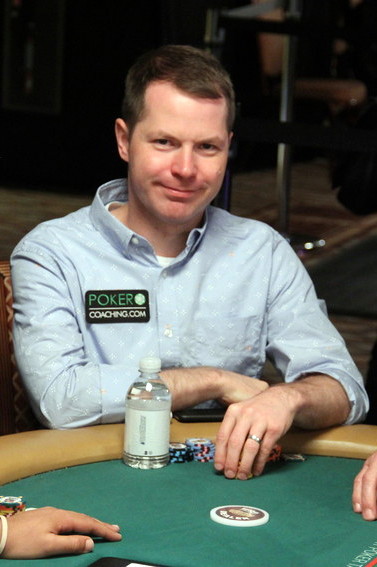






Poker Strategy With Jonathan Little: You Need To Start Bluffing!Learn To Crush Games At PokerCoaching.com/CardPlayer |
|
|

Jonathan Little
One of the most common mistakes many amateur poker players make is that they only bet when they have a strong hand. They assume that the way to win at poker is to wait for a premium hand and then pile their money into the pot, hoping some oblivious whale pays them off.
In reality, if you only put significant money in the pot with your premium hands, your competent opponents will almost never pay you off unless they happen to also make an extremely strong hand.
Suppose your opponent raises to three big blinds out of her 100 big blind stack from middle position and only you call on the button. The flop comes 8 7
7 4
4 . Your opponent bets four big blinds into the 7.5 bb pot.
. Your opponent bets four big blinds into the 7.5 bb pot.
Some players only raise in this spot with exactly 6-5, 8-8, 7-7, 4-4, and 8-7.
While there is nothing wrong with raising with these premium hands since it is nearly impossible for your opponent to have a better hand, she can easily fold her entire range, meaning you will never get value.
To solve this problem, you should bluff from time to time. The hands that are best to bluff with are those that also have some chance to improve to the best hand on the turn or river. In this case, the best bluffs are flush draws and straight draws.
If your goal is to be balanced (as it often should be against decent opponents), you can raise with about two times as many semi-bluffs as value hands because many of your semi-bluffs will improve to premium hands on the turn or river.
So, in this situation, in addition to raising with your premium made hands, you should raise with many of your draws such as 10-9, K-6 suited, 5-4 suited, and flush draws.
If you are known to have a tight image, your opponent will play poorly by folding far too often (because she will incorrectly assume that you are only raising with premium hands). If your opponent is a calling station, that is fine too, because your premium hands will extract a lot of value and your draws will complete by the river some portion of the time.
If you bet the flop and your opponent calls, it is usually wise to continue betting on the turn with most of your range. As on the flop, this will make you difficult to play against because your opponent will have no idea whether or not you have a premium hand or a semi-bluff. The same goes for the river.
It is important that you develop a strategy such that any action you take is not obviously strong or weak. If your opponents know your flop bets are always strong, you make their life easy. You win when your opponents make mistakes, so develop a strategy that will result in them making as many mistakes as possible.
If you want to quickly plug the 25 most common mistakes I see my students make, I put together a course called The 25 Biggest Leaks and How to Fix Them. This course is completely free inside Card Player Poker School!
When you join the Card Player Poker School (it’s free to join), you’ll also get:
 Jonathan Little is a two-time WPT winner and the 2024 PokerGO Cup champion with nearly $9 million million in live tournament earnings, best-selling author of 15 educational poker books, and 2019 GPI Poker Personality of the Year. If you want to increase your poker skills and learn to crush the games, check out his training site at PokerCoaching.com/cardplayer.
Jonathan Little is a two-time WPT winner and the 2024 PokerGO Cup champion with nearly $9 million million in live tournament earnings, best-selling author of 15 educational poker books, and 2019 GPI Poker Personality of the Year. If you want to increase your poker skills and learn to crush the games, check out his training site at PokerCoaching.com/cardplayer.
